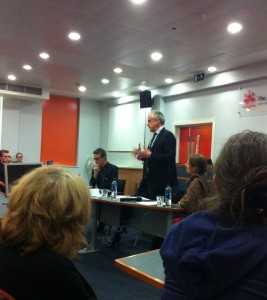Event Review: Access to Justice After the Cuts – Helen Longworth
Laura tried to renew her passport this year. She is 18, a part time worker, a first year student, was born in Britain and has had a passport since she was five. Her renewal was rejected as the Passport Office told her she’s not British.
Michael is 3. His passport application was rejected as despite having a British father he was born overseas. His parents are now stranded, they can’t leave their son so they can’t come home.
Since April 2013 there has been no legal aid for children in the immigration system. So neither Laura or Michael has the resources to question what the state is doing to them. Their ability to check the decision is right is blocked.
Stories like these inspired City student Grace Loncraine to decide the time was right to discuss the cuts to legal aid in a debate at City Law School on 19th November 2014. Opening the debate on what the legal profession’s response should be to the impact of cuts on access to representation, chair Professor Andy Boon reminded the audience of the history of the legal aid system. Introduced in 1949, 50% of the population were eligible to help with legal representation funded through collective national insurance.
By 2008 20% were eligible, and certain issues such as personal injury were cut out. In 2014 the Legal Aid, Sentencing and Punishment of Offenders Act reduced that further. Boon referred the audience to an outline of the cuts in Emma Howard’s article for The Guardian.
Following a film from the Justice Alliance, panelist Solange Valdez, supervising solicitor at Ealing Law Centre, where she specialises in immigration, opened the conversation. She told stories of cases she has seen in her work at Ealing Law Centre, including Laura and Michael above. Her ire was evident, and her bafflement at the arguments pitted against legal aid for children in legal aid cases clearly astonish her everyday.
She’s been told that social workers can assist that children can easily represent themselves, and that law centres will help. But no argument has been followed with resources, either in terms of the expertise or finances needed for any of these ideas to work. She challenged lawyers and students alike to do what is expected of those with cases to bring, to find their way around the UK Border Agency’s website, ask a simple question and see if there’s an answer that can be found easily.
Francis FitzGibbon QC, a criminal silk, with extensive experience in homicide, fraud, historic sex abuse and drug cases spoke next, opening with a quote from Dr EJ Cohen;
“[T]he State is responsible for the law. That law again is made for the protection of all citizens, poor and rich alike. It is therefore the duty of the State to make its machinery work alike, for the rich and the poor.”
[Dr E. J. Cohn, Legal Aid for the Poor, 1941]
He set that in contrast to Ken Clarke’s statement as the Legal Aid, Sentencing, and Punishment of Offenders Act (LASPO) was going through Parliament, who claimed that legal aid has made the poor “extremely litigious”, as if accessing legal remedies is a hobby rather than Cohen’s analysis as the responsibility of the State to allow the law to function at all. FitzGibbon assessed the language of cuts as a cloak hiding an ideological aim to remove access to the law from those who are not wealthy. “The sums at stake are minuscule” he said, “the harm and cost of failure is out of all proportion”. His example of what he called “rank stupidity” in the Government’s actions was Crown Court cafés closures. Closed to save money on jury’s lunches, jury members now have to go outside for more expensive food which takes more time, meaning the burden of cost is shifted to keeping court rooms running and empty waiting for the jury to return.
FitzGibbon said it is a mistake to think the issue is legal aid alone. The proposals to restrict judicial review tell a story of taking away the right to challenge the government too. There are three reviews of the Criminal Bar in progress and, while there will be some legal aid while we’re in the EU, private payment will have to increase. There are other options, confiscated assets from complex fraud cases could be returned to the legal aid pot. Lawyers working for free cannot be what the system relies on.
“I’m not a lawyer” announced Rachel Marsh of Head of Casework at LawWorks, a non-profit organisation which encourages and supports lawyers and law students in carrying out pro bono work, as she rounded off the panel contributions. “And this is not a legal problem, it’s much wider than that.” Her point was that legal aid isn’t coming back, there’s nothing to lose by giving radical ideas a go. Marsh suggested that we should take design principles to the problem: who is the person at the centre (someone needing access to a legal remedy) what is their problem (e.g. legal services cost money) what ideas could fix it? Then test as many as we can think of. Lawyers are only part of creating that solution. What do local churches, authorities, synagogues, landlords have to say? Can we prevent more problems before legal remedies are required? It was a strong challenge to those who dwell on what was lost to think of the future and making sure those who need help have a community on their side. Marsh asked the audience to think and create, there are no solutions yet but one is sorely needed.
The debate formed the crux of the evening. Questions rang round the room. Is it all politics? Will pro bono help and provide relief for those in trouble and to consciences of those who can’t leave the vulnerable stranded? Or is doing pro bono masking the horror and making lawyers complicit? Why is law inaccessible but legal problems arise every day? What is it that medicine has but law is missing when both affect everyone and both need specialists to intervene in serious settings? What is to be done about those who do poor work and take lots of money? Is the endgame an Americanised system? How does that idea persist when we know the public defender service costs the state more than the independent Bar? How can we get this reported?
For Valdez being a lawyer means not giving up on the vulnerable. For FitzGibbon the fight is political. For Marsh there are too many questions and not enough ideas. And they can all be right. There is a sense of strategic planning which hasn’t yet blossomed into clear campaigning activity. Getting anyone to join this debate from the other side seems impossible, the adversarial argument principle that underpins both parliament and the courts simply isn’t featuring in the debate.
Many thanks to Helen Longworth for this engaging write-up of the ‘Access to Justice after the Cuts’ event. Thanks also go to Grace Loncraine for organising this excellent debate with such interesting speakers. Helen and Grace are both GDL students at the City Law School.


